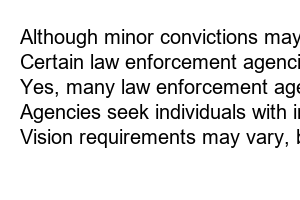경찰이 되는 방법
Title: How to Become a Police Officer: A Step-by-Step Guide
Introduction:
Becoming a police officer is a challenging and rewarding career choice that requires dedication, determination, and a strong sense of duty. In this comprehensive guide, we will provide you with a step-by-step roadmap to help you navigate the process of becoming a police officer.
1. Research Police Officer Requirements:
Before embarking on your journey to become a police officer, it is crucial to research the specific requirements of the law enforcement agency you wish to join. Different agencies may have varying educational, physical fitness, and age requirements, so familiarize yourself with these prerequisites.
2. Obtain a Relevant Education:
While a high school diploma is generally the minimum requirement, pursuing a higher education degree in criminal justice, law enforcement, or a related field can give you an edge in the highly competitive police officer recruitment process. Consider attending a reputable college or university that offers specialized programs for aspiring law enforcement professionals.
3. Develop Physical Fitness:
Physical fitness is an essential aspect of a police officer’s daily routine. Engage in regular exercise and strength training to ensure you meet the physical requirements of the recruitment process. Focus on building cardiovascular endurance, strength, agility, and flexibility to prepare for the physical challenges ahead.
4. Prepare for the Police Officer Exam:
Most law enforcement agencies require candidates to pass a rigorous written exam. Study extensively on topics such as law enforcement procedures, criminal law, ethics, and general knowledge. Utilize online resources, practice tests, and review guides to help you prepare effectively and boost your chances of success.
5. Ace the Oral Interview:
The oral interview is a critical stage in the selection process. Emphasize effective communication skills, showcase your problem-solving abilities, and demonstrate your commitment to serving the community. Practice answering hypothetical scenarios and be prepared to articulate your passion for law enforcement.
6. Successfully Complete Background Checks and Physical Assessments:
As part of the selection process, you will undergo thorough background checks, including criminal record checks and personal background investigations. Additionally, candidates must pass medical and psychological evaluations to ensure they are physically and mentally suited for the role.
7. Graduating from Police Academy:
Upon successfully passing all previous stages, aspiring police officers undergo comprehensive training at a recognized police academy. Here, you will learn essential skills such as crisis intervention, defensive tactics, firearms training, and legal procedures. The duration of this training varies by jurisdiction.
Summary:
Becoming a police officer requires a blend of education, physical fitness, and personal qualities that demonstrate a commitment to serving and protecting the community. By following the steps outlined in this guide, you can position yourself as a strong candidate in the competitive field of law enforcement and pursue a fulfilling career dedicated to upholding justice and public safety.
FAQs:
1. What is the minimum age requirement to become a police officer?
Candidates must typically be at least 21 years old to join a law enforcement agency.
2. Can previous criminal convictions hinder my chances of becoming a police officer?
Although minor convictions may not automatically disqualify you, it is essential to be honest and transparent during the background check process.
3. Are there height and weight requirements for becoming a police officer?
Certain law enforcement agencies may have specific height and weight standards, but these requirements can vary.
4. Can I become a police officer with a college degree in an unrelated field?
Yes, many law enforcement agencies accept candidates with degrees in various disciplines, although a criminal justice or related field can be advantageous.
5. What qualities are law enforcement agencies looking for in candidates?
Agencies seek individuals with integrity, strong communication skills, problem-solving abilities, teamwork, and a genuine passion for public service.
6. Can I become a police officer if I wear prescription glasses or contact lenses?
Vision requirements may vary, but generally, candidates must have corrected visual acuity to meet the agency’s standards.

